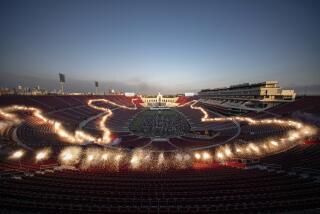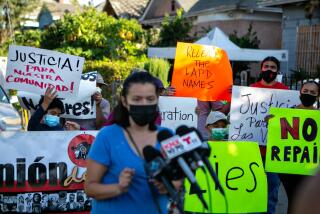The Rockets’ Red Tape : Creators of Fireworks Displays Say Regulatory Maze Threatens the Industry Even as It Booms
- Share via
RIALTO — Pyro Spectaculars, a family-run business for four generations, is the kind of place where dress is casual, workers pool their lunch money, and the president of the company knows nearly all 75 employees by name.
Housed here in a modest blue and white stucco building and a few warehouses off a dusty road in the foothills of the San Bernardino Mountains, the display fireworks company is gearing up for its busiest season ever. On Monday, 500 Pyro Spectaculars shows will light up skies from California to New York.
But although the fireworks business is booming, an ever-growing maze of federal, state and local regulations threatens to drive away Pyro Spectacular’s network of people licensed to put on the displays, company President Jim Souza says.
“It used to be fun for them, but now these regulations are so much on them that some people say, ‘It’s just not worth it anymore,’ ” said Souza, whose great-grandfather founded the company at the turn of the century.
There are only about 50 small display fireworks companies left in the country, said John Conklin, president of the American Pyrotechnic Institute in Chestertown, Md.
“The current regulatory structure is a nightmare for small business,” Conklin said. “Unless you have a minimum of one--but it almost requires two or three--people who are full-time regulatory compliance personnel, you cannot exist.”
Pyro Spectaculars has acquired three smaller companies since the late 1980s, when the regulatory bad dream started to become a nightmare. Those companies, in Rialto, San Diego and Olympia, Wash., employ from five to a dozen people each.
“They saw that the writing was on the wall and that it would just get tougher and tougher for them,” Souza said. “Next year, we’ll have two full-time people dealing just with regulations. A five-person business can’t afford that.”
Part of the problem is that the 12 government agencies that regulate Pyro Spectaculars and other display fireworks companies duplicate each other’s functions, more than doubling the paperwork the company must file, said Dean Collister, Pyro Spectacular’s vice president and regulatory point man. Not all of the agency’s regulations are cumbersome or unnecessary, he said, it’s just that there are so many of them.
Collister keeps a three-page list of Pyro Spectacular’s regulators pinned to a bulletin board in his office for easy referral. He also keeps a 10-inch-high pile of manuals handy for his quixotic quest to be in compliance with a dozen or so regulatory agencies.
Fines for noncompliance can run as high as $10,000, enough to swallow the profit of a small fireworks company, Conklin said.
The regulations cover the entire life of a fireworks shell, from its birth as gunpowder (its handling is regulated by local fire officials) until it bursts into the night sky (the pyrotechnic operator who lights it must have a license from the state).
Conditions for workers at the Rialto plant are regulated by federal and state agencies. The manufacture and storage of fireworks is regulated by the federal Bureau of Alcohol, Tobacco and Firearms and the state Fire Marshall, among other groups. Another agency requires an annual business plan. Local governments regulate the shows. And the South Coast Air Quality Management District issues a permit to burn waste.
For pyrotechnists--fireworks operators who usually do a few shows a year--regulatory compliance is also a problem. They usually carry their own materials and must comply with a U.S. Department of Transportation rule that classifies fireworks as hazardous materials.
Pyrotechnists thus need the same commercial license required to transport gasoline, propane and radioactive waste, Transportation Department spokeswoman Patricia Klinger said.
Getting a commercial driver’s license requires a battery of tests and costs about $150. That’s in addition to the $75 fee to become a licensed pyrotechnician.
“People say, ‘I’m making a couple hundred dollars shooting this display, and it’s not worth it,’ ” Conklin said.
And that can threaten even relatively large companies such as Pyro Spectaculars, which depends on the licensed hobbyists to transport and stage shows throughout the West.
Collister said Pyro Spectaculars is not against regulations that promote fireworks safety. “We’re as concerned as anybody about safety,” he said. “But it would be so much easier if they just got together and worked out one set of regulations.”
More to Read
Inside the business of entertainment
The Wide Shot brings you news, analysis and insights on everything from streaming wars to production — and what it all means for the future.
You may occasionally receive promotional content from the Los Angeles Times.










